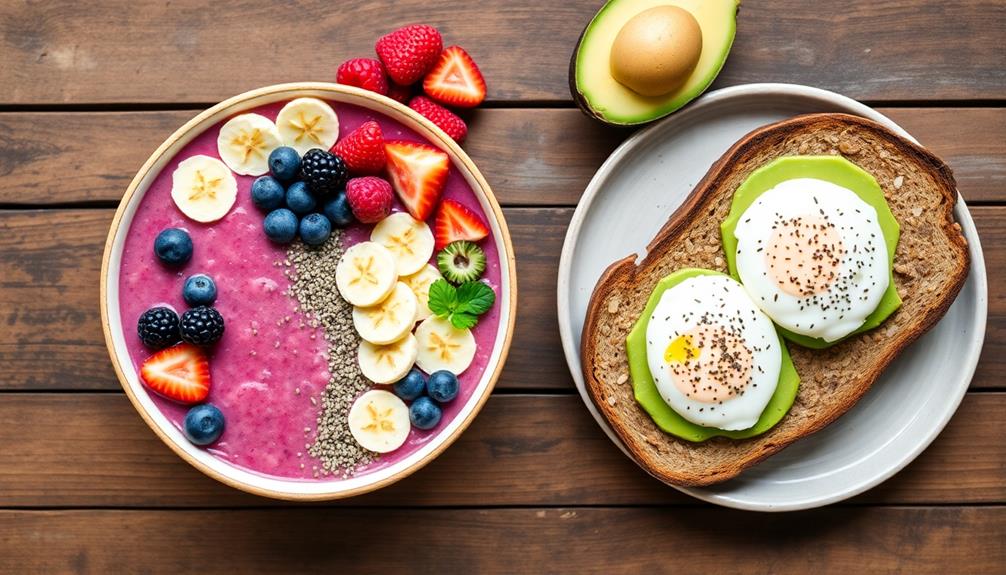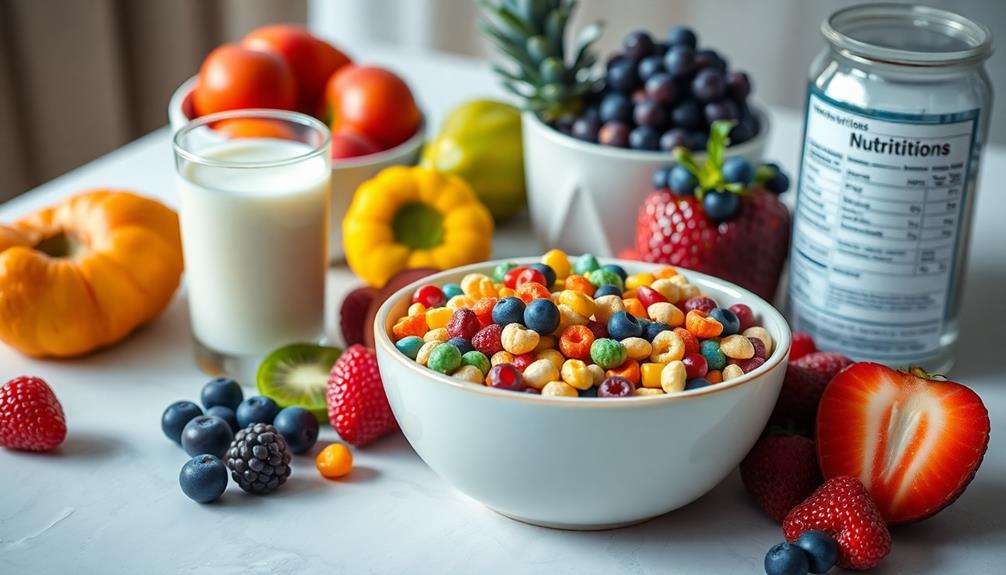Choosing a healthy breakfast is essential to kickstart your day with energy and focus. Aim for a mix of protein, fiber, and whole grains. Foods like eggs, Greek yogurt, and oatmeal are great choices. They keep you full and satisfied while stabilizing your blood sugar. Add fruits or nuts for extra nutrients. Steer clear of sugary cereals and pastries that can lead to crashes later. Meal prepping can make mornings easier, ensuring you won't skip this important meal. With the right combinations, your breakfast can fuel your body and brain effectively. There's even more to explore about breakfast options!
Key Takeaways
- Opt for protein-packed options like eggs or Greek yogurt to promote fullness and cognitive function.
- Include fiber-rich foods such as oatmeal and berries to stabilize blood sugar and enhance digestion.
- Choose whole grains over refined products to ensure essential nutrients and sustained energy levels.
- Avoid processed cereals and pastries, which are often high in sugars and low in nutrition.
- Meal prep breakfast options like overnight oats for quick, nutritious meals that fit your busy schedule.
Importance of Breakfast
Starting your day with a healthy breakfast is essential for your overall well-being. The importance of breakfast can't be overstated, as it kickstarts your metabolism and helps your body burn calories more efficiently throughout the day, aiding in effective weight management. For those with diabetes, it’s especially important to choose breakfast options that help regulate blood sugar levels. Healthy breakfast options for diabetics include high-fiber foods like oatmeal, whole grain toast, and fresh fruit. These choices can help manage blood sugar levels and provide sustained energy throughout the morning. It’s important for everyone, but especially for those with diabetes, to prioritize a nutritious breakfast to set the tone for a successful day.
Incorporating keto breakfast ideas can further enhance your morning routine, providing high-protein, low-carb options that keep you satisfied. When you choose a nutritionally balanced meal in the morning, you not only fuel your body but also enhance your cognitive function, improving memory and concentration by up to 20%.
Regularly consuming breakfast is linked to a lower risk of type 2 diabetes and metabolic syndrome, especially in adolescents who tend to skip it. In fact, studies reveal that 78% of successful dieters eat breakfast daily, highlighting its role in maintaining healthy eating patterns.
Nutritional Benefits of Key Foods
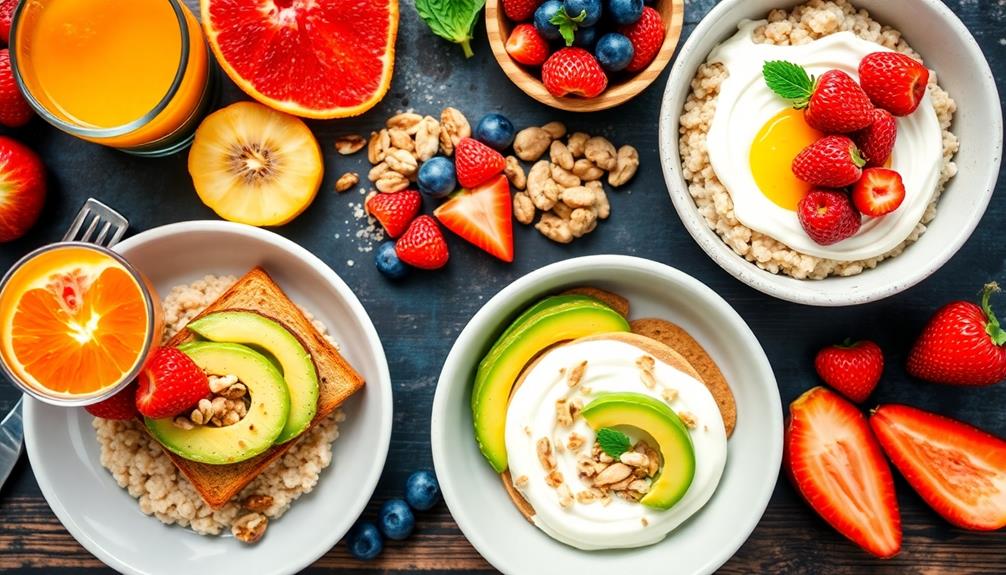
When you choose a healthy breakfast, focusing on protein-packed options and fiber-rich foods can make a big difference.
Foods like eggs, Greek yogurt, and cottage cheese provide the protein your body craves, while whole grains and berries offer the fiber needed for digestive health.
Together, these key foods not only fuel your morning but also set a positive tone for the rest of your day.
Protein-Packed Breakfast Options
A protein-packed breakfast can set the tone for your day, fueling your body with the essential nutrients it craves. Including protein-rich foods in your morning meal not only supports muscle maintenance but also keeps you energized.
Here are three delicious options to take into account:
- Eggs: With 25g of protein per serving, eggs are a powerhouse choice. They're also rich in choline and B vitamins, which help boost your energy levels.
- Greek Yogurt: This creamy delight packs 15g of protein in just 150g. Plus, it's loaded with probiotics that promote gut health, making it a satisfying and nutritious option.
- Cottage Cheese: A versatile breakfast favorite, cottage cheese offers 24g of protein per cup. Pair it with fruits or nuts for added flavor and nutrition.
Don't forget to sprinkle some nuts on your yogurt or cottage cheese. They not only add a delightful crunch but also provide healthy fats and essential minerals.
With these protein-rich choices, you'll enjoy a healthy breakfast that keeps you full and focused throughout your morning!
Fiber-Rich Food Choices
Fiber-rich foods are essential for a well-rounded breakfast, offering numerous health benefits that can enhance your overall well-being. Starting your day with oatmeal is a smart choice; it contains beta-glucan fiber, which helps lower cholesterol and stabilize blood sugar levels.
Pair it with whole grain toast for a satisfying meal that's high in fiber and complex carbohydrates, keeping you energized throughout the morning.
Don't forget to add chia seeds to your breakfast! With nearly 10g of fiber per ounce, they aid digestion and promote a feeling of fullness, helping with weight management.
Fruits like berries are also fantastic additions—high in fiber and antioxidants, they improve heart health and add a natural sweetness to your meal.
Incorporating nuts into your breakfast not only provides healthy fats but also promotes satiety thanks to their protein, fat, and fiber content.
By choosing fiber-rich foods, you'll not only enjoy a delicious breakfast but also curb cravings later in the day.
Whole Grains and Fiber
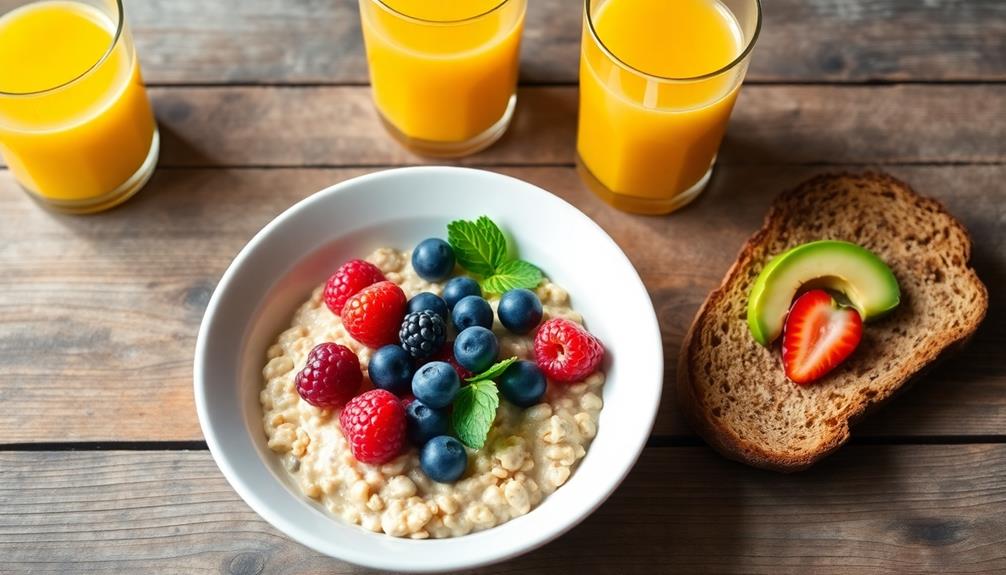
When you choose whole grains for breakfast, you're not just filling your stomach; you're fueling your body with essential nutrients and fiber.
Foods like oatmeal and whole grain toast can help stabilize your blood sugar and improve digestion.
Benefits of Whole Grains
Whole grains offer a wealth of health benefits, particularly due to their impressive fiber content. Including these high-fiber foods in your diet can greatly impact your overall health and well-being.
Here are three key benefits of incorporating whole grains into your healthy breakfast:
- Heart Health: Whole grains, like oatmeal and whole grain bread, can help lower cholesterol levels, reducing the risk of heart disease.
- Digestive Health: Options like chia seeds provide nearly 10 grams of fiber per ounce, promoting digestive regularity and helping to manage blood sugar levels.
- Appetite Control: Whole grains enhance satiety, making you feel fuller longer and decreasing the likelihood of overeating later in the day.
Fiber's Role in Breakfast
Eating a fiber-rich breakfast can greatly impact your day by promoting better digestion and keeping you feeling full longer. Incorporating whole grains into your morning routine is an excellent way to boost your fiber intake. Foods like oatmeal and whole grain toast contain beta-glucan fiber, which aids in lowering cholesterol and stabilizing blood sugar levels. This not only supports your digestive health but also plays a vital role in weight management.
When you choose high-fiber breakfast foods, you're more likely to experience better appetite control throughout the day. This means fewer cravings and lower overall calorie intake, helping you maintain a healthy weight. Additionally, a diet rich in fiber can reduce your risk of chronic diseases, such as type 2 diabetes and heart disease.
Consider adding ingredients like chia seeds to your breakfast; with nearly 10g of fiber per ounce, they can greatly enhance your meal's fiber content.
Choosing High-Fiber Options
Selecting high-fiber options for breakfast can greatly enhance your morning routine. By incorporating high-fiber foods, you can enjoy a healthy breakfast that not only tastes good but also offers numerous health benefits.
For instance, fiber-rich foods like oatmeal can support digestive health and help prevent gastrointestinal discomfort, similar to how Cranberry Juice Consumption may offer benefits for overall health.
Here are three excellent choices:
- Oatmeal: Made from rolled or steel-cut oats, it's rich in beta-glucan fiber, which helps lower cholesterol and promotes heart health.
- Whole Grain Toast: This option isn't just delicious; it also supports stable blood sugar levels and keeps you feeling full longer.
- Chia Seeds: With nearly 10g of fiber per ounce, chia seeds can be easily added to smoothies or yogurt, enhancing digestive health.
Choosing whole grains and high-fiber foods like bran muffins or whole grain cereals can help you reduce overall calorie intake throughout the day.
Plus, these choices are linked to a reduced risk of chronic diseases, including type 2 diabetes and heart disease.
Healthy Breakfast Combinations
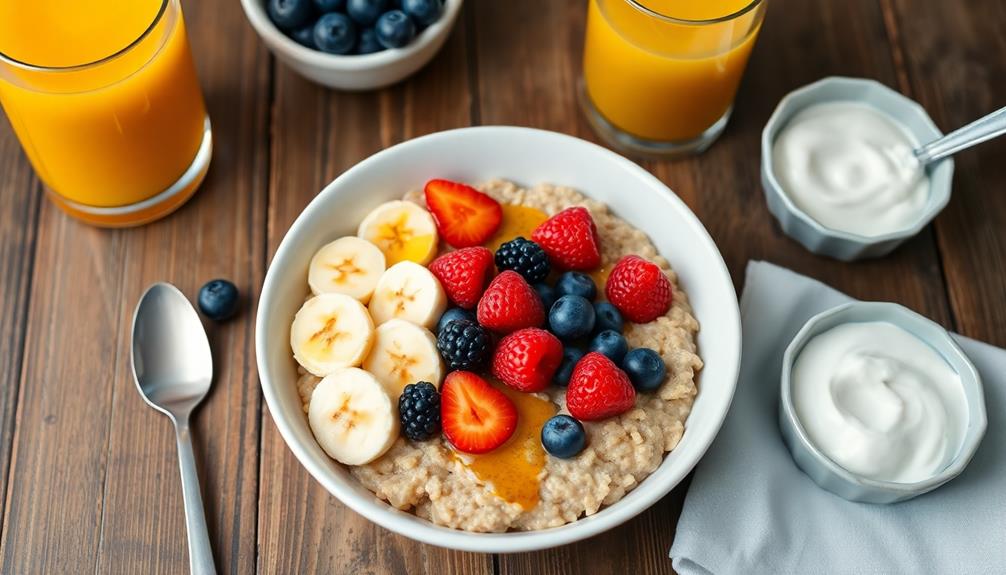
When you start your day with a nutritious breakfast combination, you set the tone for sustained energy and mental clarity. Opt for meals that pack a punch in both fiber and protein to fuel your morning. For instance, combining eggs with whole grain toast and vegetables gives you a high-protein breakfast that supports muscle maintenance while providing essential vitamins and minerals.
Additionally, incorporating fruits and vegetables into your breakfast can enhance your overall nutrient intake and support a gout-friendly diet by keeping uric acid levels in check.
Another great choice is a Greek yogurt parfait layered with fresh fruit and berries. This not only tastes delicious but also offers about 15g of protein and antioxidants, helping to promote gut health.
If you prefer something warm, try steel-cut oatmeal topped with nuts and fruits. This combination delivers complex carbohydrates, fiber, and healthy fats, aiding in blood sugar stabilization.
Smoothies are another fantastic option. Blend spinach, banana, protein powder, and chia seeds for a nutrient-dense treat that includes nearly 10g of fiber.
Beverages to Consider

A nutritious breakfast isn't complete without the right beverages to complement your meal. Choosing the right drink can enhance your morning routine, providing essential nutrients and energy. Here are three great options to ponder:
- Smoothies: Blend your favorite fruits, vegetables, and protein sources like Greek yogurt or protein powder. This creates a delicious and nutritious beverage that fuels your day.
- Green Tea: This invigorating drink offers caffeine and L-theanine, promoting alertness and relaxation. Plus, the high levels of EGCG provide antioxidants that may support brain health.
- Dairy or Plant-Based Milk: Whether you prefer cow's milk or fortified plant-based options, both can add calcium and vitamin D to your breakfast. They're perfect for pouring over cereal or enjoying with a smoothie.
Incorporating these beverages into your breakfast can boost your nutrition and keep you feeling satisfied.
Remember, a little coffee in moderation can also be part of a healthy morning routine, thanks to its polyphenols and health benefits.
Choose wisely, and you'll start your day right!
Meal Planning Strategies

Many people find that planning breakfast ahead of time makes it easier to enjoy a balanced meal each morning. By incorporating meal planning into your routine, you can guarantee that your breakfast is both nutritious and satisfying.
Focus on including protein-rich and fiber-rich foods, which will keep you energized throughout the day. Additionally, consider experimenting with coffee as a breakfast beverage; understanding the differences between espresso and coffee can enhance your morning routine and provide a delightful start to your day (various brewing methods).
Consider preparing overnight oats or smoothie packs the night before. These options not only save you time but also enhance the nutritional value of your breakfast.
When crafting your meal plan, aim to mix in a variety of healthy ingredients like fruits, whole grains, and lean proteins. This variety prevents monotony and promotes consistent healthy eating.
Scheduling breakfast as a formal appointment in your daily routine can also help prioritize this important meal. Additionally, keeping a well-stocked pantry with nutritious staples such as whole grains, nuts, and seeds allows for flexible meal planning tailored to your tastes and dietary needs.
Explore different breakfast recipes to find what you love, and soon, you'll have a repertoire of delicious, healthy options ready to go each morning!
Foods to Avoid
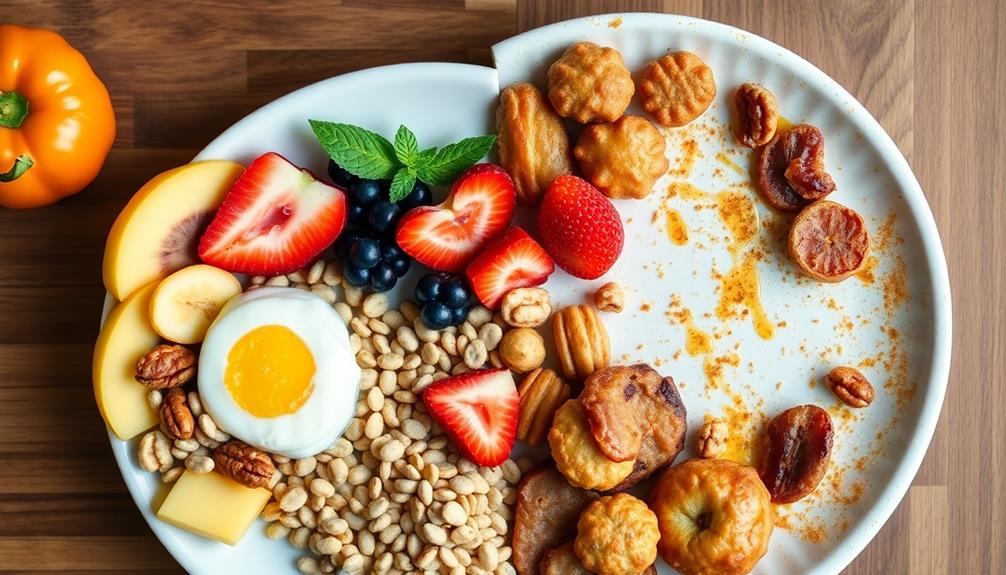
To maintain a healthy breakfast routine, it's just as important to know which foods to avoid as it's to choose nutritious options. Starting your day with the wrong foods can set you up for energy crashes and unhealthy cravings.
For instance, opting for a balanced diet rich in whole grains and fruits can support overall health and energy levels, as highlighted in effective strategies for weight loss.
Here are three categories to steer clear of:
- Processed Cereals: These often contain high levels of added sugars and artificial ingredients, making them low in nutritional value. Opt for whole grains instead.
- Pastries: Croissants, donuts, and similar treats are high in calories and unhealthy fats. They contribute to weight gain and can lead to cardiovascular issues.
- Refined Flour Products: White bread and bagels lack essential fiber and nutrients. They can cause rapid spikes in blood sugar, leaving you feeling sluggish.
You should also be wary of commercial fruit juices which can be packed with added sugars and lack the fiber found in whole fruits.
Finally, stay away from foods high in sugar, like sugary yogurt or breakfast bars, as they can lead to energy crashes later.
Common Misconceptions
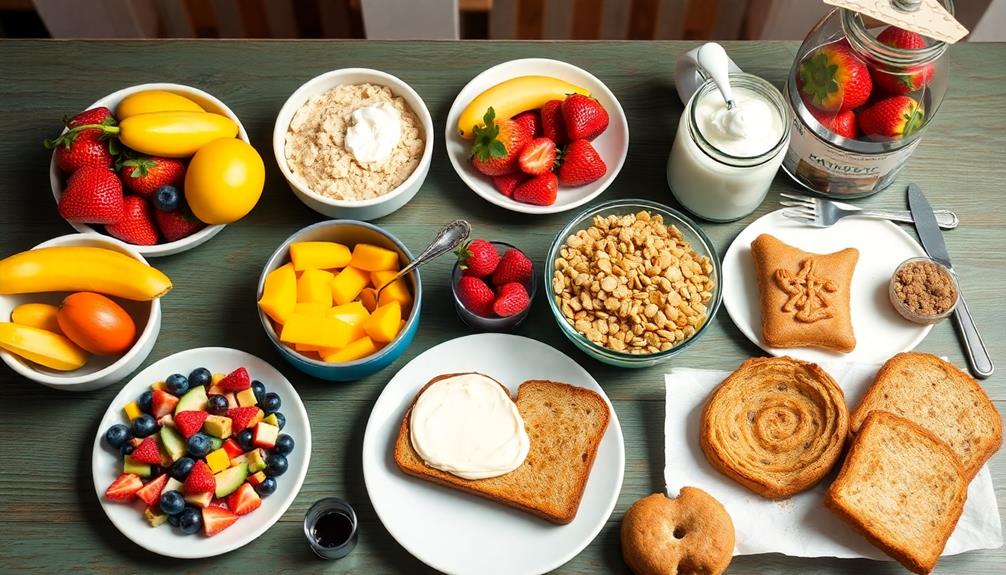
Five common misconceptions about breakfast can greatly impact your health and energy levels.
First, not all breakfast foods are healthy. Processed cereals and high-sugar juices can mislead you, undermining your nutrition.
Second, skipping breakfast won't help you lose weight; in fact, regular breakfast eaters often make healthier choices and have a lower risk of obesity.
Third, you might think you're too busy for breakfast, but meal prepping and portable options can easily fit into your hectic schedule. This guarantees you're fueling your body right.
Fourth, many assume that skipping breakfast boosts productivity, yet research shows eating breakfast can improve cognitive function by 20%, enhancing your memory and concentration.
Quick and Easy Ideas

A healthy breakfast doesn't have to be time-consuming or complicated. With these quick and easy ideas, you can kickstart your day with a nutritious breakfast that fuels your body without weighing you down.
Here are three options you can whip up in no time:
- Overnight Oats: Combine rolled oats with milk or yogurt, then add your favorite fruits and nuts. Let it sit overnight, and you'll have a ready-to-go meal in the morning.
- Greek Yogurt Parfait: Layer Greek yogurt with berries and a sprinkle of granola. This balanced option offers protein, fiber, and healthy fats, making it a satisfying choice.
- Whole Grain Toast: Top whole grain bread with nut butter and banana slices. This combination provides complex carbohydrates, protein, and healthy fats, all in under five minutes.
Frequently Asked Questions
What Is the Healthiest Breakfast to Start Your Day?
To start your day healthily, choose a balanced breakfast with protein, fiber, and healthy fats. Think eggs with whole grain toast or Greek yogurt with berries for sustained energy and better focus throughout the morning.
What Is a Healthy Breakfast to Kick Start the Day?
To kickstart your day, you'll want a breakfast that fuels, nourishes, and satisfies. Try eggs with spinach, Greek yogurt topped with berries, or oatmeal with nuts to energize you and keep cravings at bay.
What Is the Best Healthy Breakfast in the Morning?
The best healthy breakfast energizes you for the day. Consider an omelet with veggies, Greek yogurt with berries, or oatmeal topped with nuts. These options provide protein, fiber, and essential nutrients to keep you satisfied.
How Do You Choose a Healthy Breakfast?
Did you know a high-protein breakfast can reduce cravings by 60%? To choose a healthy breakfast, focus on high-protein foods, whole grains, and colorful fruits, while avoiding added sugars and planning ahead for busy mornings.
Conclusion
In summary, choosing a healthy breakfast sets the tone for your day. By focusing on whole grains, fiber, and nutritious combinations, you're fueling your body for success. Don't forget about the right beverages and meal planning to keep you on track. Remember, skipping breakfast is like throwing the baby out with the bathwater; it can lead to unhealthy choices later. So, rise and shine with a breakfast that keeps you energized and ready to tackle whatever comes your way!

